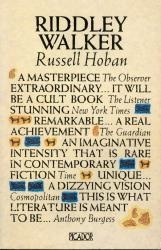
I read Riddley Walker a long time ago. It delighted me then as it delights me now. I felt, and still feel, that everyone who loves the English language should read it; I have recommended it over the years to many people. It wasn’t the first Russell Hoban book I read and, in the first instance, it was the titles that attracted me. The Mouse and his Child, The Lion of Boaz-Jachin and Jachin- Boaz. I loved his quirky oddness and went on to read more. Some memories remain with you, no matter how brief the event, or how much time has passed. They don’t’ necessarily have the significance of great life events, such as weddings and the first day at big school. Nevertheless, possibly because of their intensity, they stay in your mind. Thus I still vividly remember meeting Russell Hoban at the Hay on Wye Literature Festival. I don’t remember the year, that wasn’t important. I do remember the cottage in the field beneath the bridge where we stayed, a bunch of us who had all met on an Arvon Foundation course.Russell Hoban gave a talk and a reading. Then he stayed for a long time signing copies of his books, speaking with each person. Not hurrying anyone along. One young man staggered up holding a pile of books that he had to anchor with chin to stop them falling. They were not newly bought – which is rather the idea of a signing after all – but well worn, much read copies. Perhaps another author might have balked at this. Russell Hoban expressed his pleasure that someone had read so many of his books and patiently signed every one. I was just someone who came along to a reading by a favourite author but he made a lasting impression on me. I always remember him fondly as a kind man as well as a brilliant writer. Back to Riddley Walker. It’s quite strange to re-read a special book, one that made an enormous impact on you years before. There’s always the danger that some of the magic will have gone because you are no longer the same person. I didn’t experience that with Riddley Walker, but certainly it was a different experience this time round. I won’t say a great deal about the plot, as there are some splendid and detailed reviews on Goodreads. Suffice to say that the book is set in the remote future, perhaps some 2000 years after our world has been wiped out in a nuclear holocaust. Set in Inland – England, one of the easier words to figure out – it is the story of 12 year old Riddley Walker living in a society that has regressed to the iron age, with only distorted remnants of knowledge of what went before the 1Big1.
This is a book that it pays to read slowly. Indeed you really have to read it slowly to untangle the mishmash of phonetic and dimly remembered vocabulary, much of which bears no resemblance to the original. It can, at times, be extremely frustrating as you mouth some words over and over, putting the emphasis on different syllables, trying to work out what they mean, because you know you can figure it out. I got hung up on the Eusa story. If I’d looked at the Acknowledgements on the first page it was staring me in the face, so this is not a spoiler. Nevertheless I was sure I should know what it meant and had forgotten it was based on the story of St Eustace and his connection to Canterbury – Cambry. Defeated, I got up in the middle of the night and Googled it! That’s the effect this book has on you. It’s like reading a puzzle. Endlessly intriguing, infuriating and joyful by turns. For me, though, it’s the language that pulls me in. I was going to say more than the story, but in fact the two are so intertwined it would be hard to say when one ends and the other begins. Every time you read it you find something different. I picked up the book just now to find some words to use as examples. And suddenly realised that ‘aulder trees’, which I had imagined to be ‘Alder’ trees are in fact ‘older trees’. Doh! Even as I write this I’m conscious of the things I’ve left out. Not least of which are the many cultural references and the philosophy. “… the manying and the millying its all 1 thing it dont have nothing to gether with. You look at lykens on a stoan its all them tiny manyings of it and may be each part of it myt think its sepert only we can see its all 1 thing. That’s how it is with what we are its all 1 girt big thing and divvyt up amongs the many.” There is still one thing that puzzles me – the reference to Rizlas. It seems so out of keeping with the rest of the fragmentary, distorted language. Nevertheless, I’m sure a writer of the calibre of Russell Hoban meant it to be there. I only wish I could ask him. I’m sure he’d reply, were he still with us. |
Take your time: this is a book to savour
Reply
